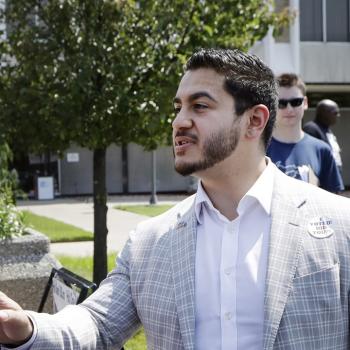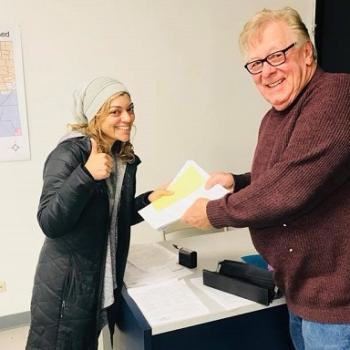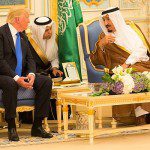 |
|
Yahya Birt (right) with Martin Bright, creator of a documentary critical of the MCB
|
For the past seven years, the City Circle in London has provided a forum for Muslims and others to explore issues dealing with identity and politics in British society and elsewhere in the Muslim world. In that time, the group has gained a reputation for venturing where few Muslim organisations dare.
When the BBC aired a documentary critical of the predominant British Muslim organisation (the Muslim Council of Britain), the City Circle invited the producers to sit face to face with MCB representatives to air their differences. When the MCB made the decision to boycott Holocaust Memorial Day, the City Circle responded with their own commemoration. After former Foreign Secretary Jack Straw made controversial comments regarding the niqab, he felt comfortable enough to engage with a critical, but civil, audience at a City Circle forum.
Tariq Ramadan, the well known Swiss Islamic scholar who was barred from entering the US, found a home not only at Oxford University, but at numerous City Circle forums where he has found an appreciative audience. The group’s list of past events is as extensive and dynamic as any organisation – Muslim or non-Muslim – that seeks to understand Islam in a western context, in addition to providing weekly gatherings for networking, social activism, and critical debate.
From this success, the City Circle has decided to expand its presence from London to chapters in Birmingham and Manchester and has appointed a new director who is an accomplished individual in his own right. Yahya Birt, the 38-year old son of former BBC director John Birt, is a writer and a research fellow at the Islamic Foundation in Leicester and begins this position in December.
The change comes at the same time the MCB has fallen from favour from the British Labour government’s post-7/7 dialogue with Muslims, leaving speculation that introspective, nondogmatic groups like City Circle would be the preferred consultants of choice (though this is unrelated to the group’s planned expansion) and prompting Prospect magazine to ask whether Birt is destined to be “Britain’s most powerful Muslim.” Despite this, the City Circle insists it is not explicitly a political organisation.
We spoke with Yahya about these new developments.
![]() Tell us about the new direction of City Circle in this expansion and your new role as Director.
Tell us about the new direction of City Circle in this expansion and your new role as Director.
Yahya Birt: Essentially, City Circle is expanding into two other British cities with significant Muslim populations, but at the invitation of people from those cities. We want to run a decentralised franchise, branded as City Circle but we’re very keen for local communities to determine the pace and nature of debate that they want to undertake and to determine their own priorities.
![]() So I’m assuming that it will have the same focus as City Circle now has. It’s beyond just lectures, right?
So I’m assuming that it will have the same focus as City Circle now has. It’s beyond just lectures, right?
That’s right. Essentially there are two strands. You have the spaces for open debate and we think that open debate is very important in Muslim communities for us to hone and shape our vision and develop more sophisticated understandings in our current day context. But it’s also, if you like, a networking opportunity to get young professionals to volunteer their time and expertise in providing solutions to pressing issues in the more deprived parts of our Muslim communities around the UK.
![]() One thing I’ve noticed in my observation and attendance of City Circle events is this issue of open debate. I remember when Jack Straw made his comments, the City Circle had a forum where they invited him to speak. It’s not something, I think, a lot of Muslim organisations would have normally done. How do other Muslim organisations in Britain regard City Circle? Is there a contention there?
One thing I’ve noticed in my observation and attendance of City Circle events is this issue of open debate. I remember when Jack Straw made his comments, the City Circle had a forum where they invited him to speak. It’s not something, I think, a lot of Muslim organisations would have normally done. How do other Muslim organisations in Britain regard City Circle? Is there a contention there?
I think that City Circle definitely is the subject of a lot of discussion and speculation, perhaps. A lot of it admiring, but not all of it favourable. Certainly, City Circle has pushed the envelope. A lot of people in the community feel comfortable condemning and not dialoguing and not bringing up internal debates in public. But we believe, actually, that only with open debate will difficult issues get discussed. It’s quite easy to hide things away in private, frustrated conversations.
But bringing them out into the open actually has a galvanising effect, I think. It allows people to see things afresh and to break a few taboos and to really explore issues properly rather than leaving them to one side. And we see that it has spin-off effects, so that people are able to endorse or enter into new campaigns and get involved in different strands of public participation. We see it as a tool of democratisation within our communities which can empower them and enable them to determine their own priorities.
![]() Do things like the City Circle reach a broad spectrum of Muslims, or is it, like you mentioned before, geared towards professional Muslims who may be more educated? Is it reaching as many Muslims as it should?
Do things like the City Circle reach a broad spectrum of Muslims, or is it, like you mentioned before, geared towards professional Muslims who may be more educated? Is it reaching as many Muslims as it should?
I don’t think we conceived of City Circle, necessarily, as a mass movement, but certainly the attendance at the London lectures does vary according to who comes to speak or what kind of debate it is. It would oscillate between 200 up to the high hundreds or low thousands if we’re doing a joint event with some other youth organisations in London.
We capture different sorts of audiences with different sorts of speakers. Quite often, ours is one of the only platforms where quite disparate people would get together to debate an issue. They would usually follow one speaker or another. So I think we can get a wide cross section, particularly if the debate is very topical.
But I would say, obviously, it’s going to be quite a middle class catchment. I think that’s fairly inevitable. But it doesn’t mean that we would want to be non-inclusive. I think we could probably in the future experiment with different kinds of debating structures as well, not a “question time” format, but maybe self-discussion groups among youth groups and things like that, which are also very effective as well. So there are lots of different methods, perhaps, that we could develop in the future too.
An extended version of this interview can be found in the November 24th edition of the alt.muslim review podcast.
Zahed Amanullah is associate editor of altmuslim.com. He is based in London, England.











